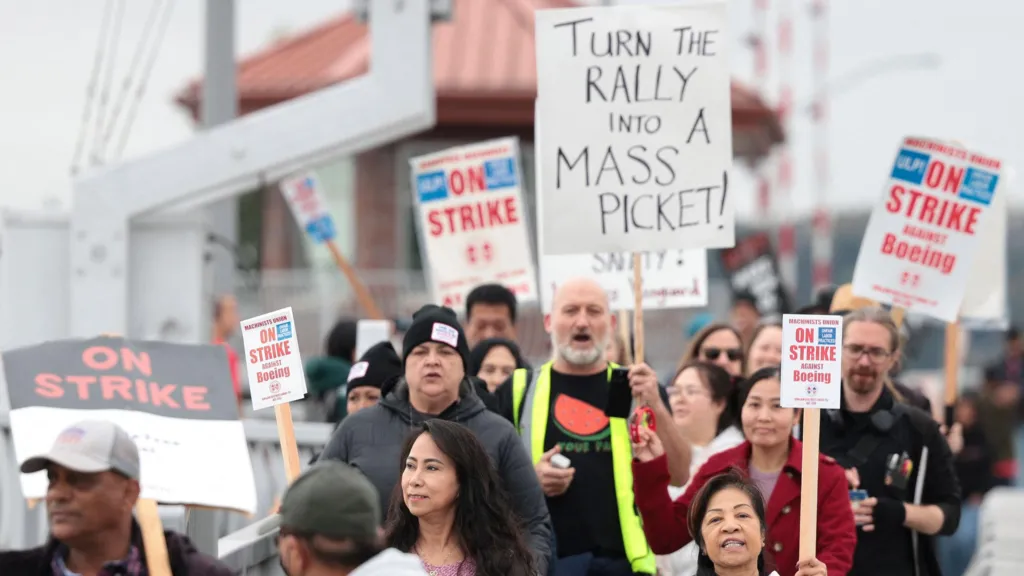
Boeing Seeks Funding Amid Worker Strike
To address ongoing challenges, Boeing plans to secure up to $35bn in funding as a costly worker strike enters its second month. Specifically, the company will raise up to $25bn through stock and debt offerings, alongside a $10bn deal with major banks. Boeing stated that these steps are necessary to support liquidity during this challenging period.
On Tuesday, more than 30,000 Boeing workers, represented by their union, therefore held a rally in Seattle. Talks to end the walkout broke down last week after Boeing withdrew an offer that included a 30% pay rise over four years. As a result, the strike, which is now in its second month, has had a significant financial impact on Boeing, with S&P Global estimating that the strike costs around $1bn per month.
Boeing’s Plan for Workforce Reduction
Boeing is also moving ahead with plans to lay off around 17,000 workers. Moreover, redundancy notices are expected to be issued in mid-November. These layoffs will be compulsory, with workers receiving severance payments. For now, the layoffs will not affect striking workers.
Additionally, the company recently announced a 10% workforce reduction. Furthermore, it also projected a loss for the last three months of the year. Additionally, Boeing delayed deliveries of its 777X planes by a year, adding further pressure on its operations.
Financial Impact and Future Challenges****Boeing’s Financial Challenges
Government and Union Involvement****Government’s Role in Resolving the Strike
The ongoing strike has drawn the attention of the Biden administration, as Boeing plays a crucial role in the US economy. On Monday, acting US Labor Secretary Julie Su met with representatives from the International Association of Machinists and Aerospace Workers (IAM) and Boeing executives in Seattle. Congressional Democrats from Washington state have urged both Boeing and IAM to “redouble efforts to reach a mutually beneficial resolution.”
Union Rally and Solidarity****Union Actions and Worker Sentiment
The union rally on Tuesday showed solidarity among Boeing workers. Meanwhile, the company’s latest actions to raise funds and cut costs highlight the challenges it faces amid this prolonged labor dispute. Boeing’s quarterly results, due on 23 October, will provide more insight into the financial toll of the strike.
Financial Moves and Market Response
Consequently, Boeing’s decision to raise funds through stock and debt offerings, along with a $10bn bank deal, led to a 2.2% rise in its shares. Boeing described these measures as “prudent steps to support liquidity.” These funding moves came shortly after the company announced its workforce reduction plans and projected a loss for the quarter.
Credit Rating Concerns and Long-term Impact
Major credit rating agencies have warned that the ongoing strike could lead to downgrades for Boeing, which would increase its borrowing costs. Due to these pressures, the financial strain of the strike has forced Boeing to secure funding to maintain liquidity amid uncertainty. Furthermore, the delay in aircraft deliveries and the workforce reduction may impact Boeing’s long-term recovery.
Future Outlook and Company Strategies
To navigate these challenges, Boeing is focusing on securing sufficient funding and managing its workforce effectively. The company aims to stabilize its financial position by raising capital and addressing the strike issues. Moving forward, therefore, maintaining good relationships with workers and unions will be crucial to avoid further disruptions.
External Link: BBC
Internal Link: Kenkou Land



